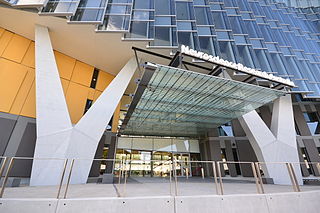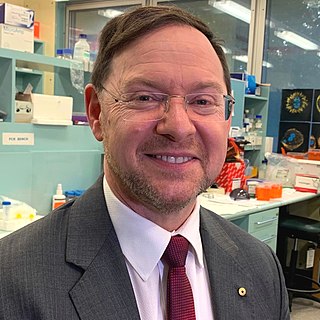
Metastasis is a pathogenic agent's spread from an initial or primary site to a different or secondary site within the host's body; the term is typically used when referring to metastasis by a cancerous tumor. The newly pathological sites, then, are metastases (mets). It is generally distinguished from cancer invasion, which is the direct extension and penetration by cancer cells into neighboring tissues.

The Royal Prince Alfred Hospital is a large teaching hospital in Sydney, Australia, located on Missenden Road in Camperdown. It is a teaching hospital of the Central Clinical School of the Sydney Medical School at the University of Sydney and is situated in proximity to the Blackburn Building of the university's main campus. RPAH is the largest hospital in the Sydney Local Health District, with approximately 1200 beds. Following a $350 million redevelopment, the perinatal hospital King George V Memorial Hospital has been incorporated into it.

WEHI, previously known as the Walter and Eliza Hall Institute of Medical Research, and as the Walter and Eliza Hall Institute, is Australia's oldest medical research institute. Sir Frank Macfarlane Burnet, who won the Nobel Prize in 1960 for his work in immunology, was director from 1944 to 1965. Burnet developed the ideas of clonal selection and acquired immune tolerance. Later, Professor Donald Metcalf discovered and characterised colony-stimulating factors. As of 2015, the institute hosted more than 750 researchers who work to understand, prevent and treat diseases including blood, breast and ovarian cancers; inflammatory diseases (autoimmunity) such as rheumatoid arthritis, type 1 diabetes and coeliac disease; and infectious diseases such as malaria, HIV and hepatitis B and C.

Hyperplasia, or hypergenesis, is an enlargement of an organ or tissue caused by an increase in the amount of organic tissue that results from cell proliferation. It may lead to the gross enlargement of an organ, and the term is sometimes confused with benign neoplasia or benign tumor.

John Shine is an Australian biochemist and molecular biologist. Shine and Lynn Dalgarno discovered a nucleotide sequence, called the Shine–Dalgarno sequence, necessary for the initiation of protein synthesis. He directed the Garvan Institute of Medical Research in Sydney from 1990 to 2011. From 2018 to 2022, Shine was President of the Australian Academy of Science.
Bevacizumab, sold under the brand name Avastin among others, is a monoclonal antibody medication used to treat a number of types of cancers and a specific eye disease. For cancer, it is given by slow injection into a vein (intravenous) and used for colon cancer, lung cancer, ovarian cancer, glioblastoma, hepatocellular carcinoma, and renal-cell carcinoma. In many of these diseases it is used as a first-line therapy. For age-related macular degeneration it is given by injection into the eye (intravitreal).
The Kolling Institute is located in the grounds of the Royal North Shore Hospital in St Leonards, Sydney Australia. The institute, founded in 1920, is the oldest medical research institute in New South Wales.

Sanford Burnham Prebys is a 501(c)(3) non-profit medical research institute focused on basic and translational research, with major research programs in cancer, neurodegeneration, diabetes, infectious, inflammatory, and childhood diseases. The institute also specializes in stem cell research and drug discovery technologies.
The International Cancer Genome Consortium (ICGC) is a voluntary scientific organization that provides a forum for collaboration among the world's leading cancer and genomic researchers. The ICGC was launched in 2008 to coordinate large-scale cancer genome studies in tumours from 50 cancer types and/or subtypes that are of main importance across the globe.

Neuroscience Research Australia is an independent, not for profit medical research institute based in Sydney, Australia. The institute is made up of over 400 researchers specialising in research to improve the lives of people living with brain and nervous system disorders. The institute’s research spans neurodegeneration, including dementia and Parkinson’s disease; mental health and mental illness including bipolar disorder and schizophrenia; and translational neuroscience including falls prevention, pain and injury prevention.
The Westmead Institute for Medical Research is a large medical research institute located at Westmead in the western suburbs of Sydney, Australia. The institute is closely affiliated with Western Sydney Local Health District and The University of Sydney and comprises approximately 500 medical research and support staff and students.
Levon Michael Khachigian is an Australian medical research scientist notable for his work in vascular cell and molecular biology. He is a Professor in the Faculty of Medicine at the University of New South Wales.
The Heart Research Institute (HRI) is a not-for-profit research facility, originally based in Camperdown, New South Wales, Australia and currently based in Newtown, New South Wales.

Rachael Anne Dunlop, popularly known as Dr. Rachie, is an Australian medical researcher and skeptic. She is a postdoctoral fellow in cell biology at the University of Technology Sydney.

Leslie "Les" Lazarus was an Australian endocrinologist who was one of the first two Directors of the Garvan Institute of Medical Research, Sydney from 1966 to 1969 and sole Director from 1969 to 1990. At the Garvan Institute he led a joint laboratory and clinical research team studying diabetes and pituitary hormone secretions, in particular the secretion and clinical uses of human growth hormone.
The Woolcock Institute of Medical Research (WIMR) is an Australian medical research institute that is focused on the prevention and treatment of sleep and respiratory disorders, lung cancer, and tuberculosis. Affiliated with the University of Sydney and the Royal Prince Alfred Hospital, the Woolcock Institute is located in the Sydney suburb of Glebe, New South Wales; with a satellite office located in Hanoi, Vietnam.The Executive Director of the Woolcock Institute since July 2012 is Professor Carol Armour.

John E. J. Rasko is an Australian clinical hematologist, pathologist and scientist whose research focuses on gene and stem cell therapy, experimental haematology and molecular biology. He directs the Department of Cell and Molecular Therapies at Royal Prince Alfred Hospital, heads the Gene and Stem Cell Therapy Program at the Centenary Institute, Sydney, and is Professor of Medicine, Sydney Medical School, the University of Sydney. He is a science communicator, often interviewed on Australian radio and television, and is a regular contributor to Breakfast, Radio National, ABC. Rasko delivered the ABC's 2018 Boyer Lectures. Entitled Life Re-engineered, they examined the history and impact of gene and cell therapies.
David James Burke is an Australian neurologist and clinical neurophysiologist. He has held senior positions at the Prince of Wales Hospital, University of New South Wales and University of Sydney. He led one of two teams that formed the Prince of Wales Medical Research Institute, which was renamed Neuroscience Research Australia in 2010. His career has included a focus on the role of spinal cord circuits in the control of movement, the excitability of peripheral nerve axons in health and disease, and other areas of clinical neurophysiology.
Jodie Ingles is an Australian cardiac researcher and professor. They head the Clinical Cardiac Genetics Group in the Molecular Cardiology Program at the Centenary Institute of Cancer Medicine and Cell Biology in Sydney, Australia.

Robert Michael Graham is an Australian-born clinician-scientist. He is the Des Renford Professor of Medicine at University of New South Wales and the Head of the Molecular Cardiology and Biophysics Division at Victor Chang Cardiac Research Institute.











